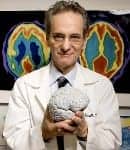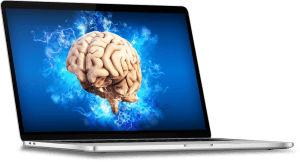Podcast: Download
Subscribe: Apple Podcasts | RSS
Have you ever wanted simple memory improvement tips that you can use straight out of the box?
If so, then you’re in full a real treat. On this episode of the Magnetic Memory Method Podcast, Dr. Gary Small offers you some of the best ideas from his book, 2 Weeks to a Younger Brain.
It was such a pleasure speaking with memory training and brain health fitness expert Dr. Small that I’ve had the interview transcribed. You can read it below or download a PDF version of the interview using the link at the bottom of the transcription.
Enjoy!
Why Even The Young Can’t Avoid Memory Loss
Anthony: Dr. Small, what is your first memory of being interested in the subject of memory?
Dr. Small: Well, I think I got interested in it when I started studying Alzheimer’s disease and geriatrics. When I got into the field of gerontology, I realized that one of the biggest problems we face is cognitive decline as we age. (Here are some cognitive activities that can help.) Alzheimer’s is the most common cause of that decline. It turns out, before people get Alzheimer’s disease, they have milder memory complaints. There is just so much worry and concern among millions of people about these age-related memory slips and what we can do about them. That’s really how I got started.
Anthony: You mentioned in the book that memory can start decaying or getting worse even younger than we think. What is one of the typical ages that memory loss can start to occur?
Dr. Small: Usually people begin to notice it in their 40s and studies of neuropsychological testing, pencil and paper tests done on many, many research subjects, has found that for the average 40‑year-old a decline in memory performance can be detected. However, we have done some recent studies, collaborating with Gallop Poll, where we find that people even in their early 20s begin to start complaining about their memory. Now, their complaints are probably different from those of somebody who is in their 70s, but still the methods we’ve developed for the book apply to people of all ages.
Anthony: Given this wide age range, is there a common so to speak anti-memory activity that people are engaging in every day and if so what are those things and how can they be treated or how can people go about their daily activities differently so that they are honoring their memories and their brains?
Dr. Small: That is really what the book is about and it takes the latest science of the brain and explains it in a way that people can understand. It then translates that science into practical strategies that people can begin using.
In the 2-week program, we introduce them to these exercises, strategies and they gradually build up their mental strength, and memory power over that 2-week period and it is just long enough for those exercises to become habit-forming. It involves physical exercise, it involves mental stimulation, stress management, nutrition and learning techniques to compensate for any age-related memory challenges people are experiencing.
Can We Really Trust Memory Exercises To Ward Off Alzheimer’s?
Anthony: You mentioned a lot of different memory exercises in the book. I am wondering if you have a personal favorite out of them all that addresses some of the prevention of Alzheimer’s and just longevity in general that you enjoy the most that you do yourself?
Dr. Small: Let me just clarify. I do not know that the memory exercises will prevent Alzheimer’s, but I think that physical exercise very well may delay the onset of symptoms as will general mental stimulation and proper diet. What the memory exercises will do is to compensate for the decline so people can have a stronger memory longer even as their brains age.
If you look at all of these different exercises, it really boils down to two methods that we now call focus and frame. We need to focus our attention because the biggest reason people do not remember is they are simply not paying attention, they are not getting the information into their brains.
Frame is shorthand for trying to frame the information, providing a framework so that it has meaning. If something is meaningful, it will become memorable and we do that by using visual images. Our brains are hardwired to remember visually very effectively.
We can take a very common memory complaint like names and faces, forgetting names and faces, and teach people how to create visual images to link the name to the face. Therefore, if you meet Mr. Foreman, you might notice that he has a prominent forehead. You notice that distinguishing figure and that links it up with the name in a visual way.
The Shocking Truth About Visual Skills And Memory
Anthony: Many of the memory exercises do involve some sort of visual imagination, and one thing I hear from a lot of people is that they are just not visual. They are maybe more auditory or kinesthetic or conceptual. Is there any advice you would have who would feel they do not have the visual capacities that many of these exercises seem to call for?
Dr. Small: That gets down to a common principle that we want to train and not strain our brains and try to cross-train the brain. Everybody has innate strengths and weaknesses. In areas that are weak, it may be visual skills. Those can be built up gradually. In areas that are strong, we can leverage those strengths to help us compensate better. People who are better with auditory skills can say the name or word to themselves or think up a musical jingle that might help them remember something better.
The Minimalist Guide To Einstein’s Brain
Anthony: You mentioned in 2 Weeks to a Younger Brain a few times Einstein’s brain and maybe you can describe that a little bit. Why does not everyone have a brain automatically like Einstein’s brain?
Dr. Small: I think, to a certain degree, it is genetics. Let us face it some people are Einstein’s at birth and others are not. When they looked at Einstein’s brain remarkably, it looked very much like the average person’s brain except for this area called the corpus callosum, which is the connecting point between the right brain and the left brain. What we might theorize is that Professor Einstein was better able to process information quickly compared to the average person.
Another point we make in the book is that genetics is only part of the story. In fact, the MacArthur study on successful aging taught us for the average person nongenetic factors are more important to keeping your brain young. That is why we emphasize all the simple things that people can do every day to get their brains to function better and their memory to be sharper.
What Video Games Can Teach You About
Strengthening Or Harming Your Brain
Anthony: One of the interesting stories in the book is you talk about chiding your son for playing video games and there is a bit of a surprising twist at the end of the story. What is going on with video games and memory?
Dr. Small: It is complicated, but we do devote a whole chapter to brain games and what people can do to use them effectively. That was an incident where I was annoyed by my son playing some kind of a violent videogame. Knowing that this kind of repetitive videogame playing may not be great for his developing brain, I shouted to him, “Harry, get off of that video game and come downstairs and watch television with me.”
Of course, I thought how ridiculous that sounded, but in my mind, I was thinking we are watching a public television program, it is educational, we will have a conversation, but what I did not realize was that my son was playing the videogame with his friends. There was a conversation going on. It was a social interaction.
I think our relationship with this new technology is very complex. In some ways, it can cause wear and tear on our brains when we are spending too much time doing email or searching online doing repetitive tasks. On the other hand, the technology actually augments our biological memory.
We could pick and choose what we try to remember like names and faces and socially that is very important, but we do not need to remember birthdates and appointments. We can use programs for that and we can look at a lot of stuff up. In addition, there are new video games that actually train our brains. They can boost IQ or improve multitasking skills. I am very excited about the technology we use it wisely and do not overuse it.
How Classy Is The Neighborhood Of Your Brain?
Anthony: Speaking of technology, there is something really interesting that you talk about. The brain has kind of a relationship to memory and information where the age of a memory somehow determines where it is located in the brain, and that memories travel from one lobe to the next. I have this picture of sorting files through my computer and they move according to date and rearrange themselves. What is happening in this idea that memories age and then that determines where they are found in the brain?
Dr. Small: The brain is very complex organ and there is a lot of neuroscience research understanding how memories are consolidated. We describe how there are very fleeting momentary memories we call sensory memories that we all experience from moment to moment and we do not notice them. If we pay attention, or if there is an emotional component to the memory, it is more likely to be consolidated in an area that is called the hippocampus underneath the temples.
Once that happens, it is like an information highway as the memory becomes stronger as it becomes more long-term it moves towards the front part of the brain very gradually. They also reside throughout the brain depending on the type of memory. If it is a visual memory, it will be in the back of the brain because that is where the visual cortex is.
It is quite an interesting phenomenon. These memories, in a sense, live in neighborhoods, which explain why it is often difficult to remember some information, but when you are reminded of a neighboring memory, then the memory you are looking for comes back to you.
Is There A Way To End Your Struggle With “Senior Moments”?
Anthony: That is a very interesting metaphor. Given this neighborhood image where do memories go when people are having “senior moments?”
Dr. Small: Senior Moments are not going anywhere. Memory is very much like a filing cabinet. You have to file the information in the proper place and know where to look to pull it out. When we cannot find those memories, we are distracted by other memories so we are a little bit mixed up in our filing system, and we need some help in how to locate those files, which many of the memory techniques we teach help us do.
Anthony: Well heaven forbid that you were to lose your memory, but if that were to happen, is there one memory in particular that you would never want to lose if all else was to disappear?
Dr. Small: Those are such tough questions, and I think to me the memory I would not want to lose is the memory of the emotion of love because I think that is so important to all of us. It is such a strong compelling feeling. It really draws people together and it defines who we are as a species. Humans are very social animals and those positive emotions that we experience really make life so worthwhile.
Anthony: Speaking of love I really loved 2 Weeks to a Younger Brain. I am grateful and honored that you gave us the time to speak about your book for the audience of this podcast. What is coming up for you next?
Dr. Small: In the short term, I am doing a public lecture on the book this afternoon. I am continuing my research on memory and brain aging. My wife and I are continuing to work on a monthly newsletter, Dr. Gary Small’s Mind Health Report. We are putting our heads together for the next book. We have not quite decided what we are going to do but it will probably be in the general area where our interests lie and we are looking forward to continuing our work together.
Anthony: Great. Well again thank you so much and 2 Weeks to a Younger Brain is such an excellent book. I hope everybody listening goes out and gets it.
Dr. Small: Thank you and I appreciate it.
Further Resources
Dr. Small talking about his book, The Alzheimer’s Prevention Program.






Hi, Anthony,
Great interview! I’m definitely heading over to Amazon to pick up Dr. Small’s book.
I need to “train, not strain” my brain now that I’m over 50.
Sue
Nice to see you here, Sue. Thanks for stopping by!
I’ve been going through the exercises in the book myself and they have an impact from day one. I’d love to here how they help you when you do them over three weeks. Frankly, I think doing only 20% of them will help a great deal on busy days.
Great podcast. Thanks!
Thanks, Brunno! I appreciate you taking the time to comment. 🙂
Anthony,
I just finished a long drive from Chicago to Houston and back. Had lots of time to listen to podcasts. Bumped into yours via iTunes as I was looking for tips on memory. I got hooked on your podcasts, although they were not what I was looking for initially, I believe you provide a lot of value on memory methods and creativity. I appreciate your efforts and I am starting to incorporate techniques you discuss!
Thanks for taking a moment to let me know you’re enjoying the podcast, Ted. Much appreciated and I’m so glad you’ve started using memory techniques! 🙂
Very interesting. I want to train my memory and not strain it.
Thank you.
Ron
That’s great, Ron. The good news is that it’s easy to do.
Any particular areas in which you want to improve it (names, numbers, for learning a language)?
This was encouraging to listen to, and I’m adding this to my read list. Thank you.
Funny enough I am 53 now, changed careers just a year ago, and can definitely say your book the Victorius Mind was my starter. I look forward to the new books. I feel like my memory has improved despite late age diagnosis of ADHD ~ Squirrel LOL